-
 Bitcoin
Bitcoin $85,667.5889
1.45% -
 Ethereum
Ethereum $1,645.0464
1.09% -
 Tether USDt
Tether USDt $0.9999
0.01% -
 XRP
XRP $2.1508
1.30% -
 BNB
BNB $589.4345
-0.06% -
 Solana
Solana $131.4976
-0.50% -
 USDC
USDC $0.9999
0.00% -
 TRON
TRON $0.2514
-1.73% -
 Dogecoin
Dogecoin $0.1601
-2.43% -
 Cardano
Cardano $0.6447
0.89% -
 UNUS SED LEO
UNUS SED LEO $9.4306
0.49% -
 Chainlink
Chainlink $12.7413
0.32% -
 Avalanche
Avalanche $20.0223
0.06% -
 Stellar
Stellar $0.2413
0.24% -
 Toncoin
Toncoin $2.9581
4.42% -
 Sui
Sui $2.2029
-2.07% -
 Shiba Inu
Shiba Inu $0.0...01196
-1.39% -
 Hedera
Hedera $0.1666
0.16% -
 Bitcoin Cash
Bitcoin Cash $335.2737
-1.78% -
 Litecoin
Litecoin $78.2670
0.57% -
 Polkadot
Polkadot $3.6968
1.17% -
 Hyperliquid
Hyperliquid $16.3661
2.35% -
 Dai
Dai $1.0000
0.00% -
 Bitget Token
Bitget Token $4.3524
2.42% -
 Pi
Pi $0.7432
-1.22% -
 Ethena USDe
Ethena USDe $0.9990
0.02% -
 Monero
Monero $212.4190
2.42% -
 Uniswap
Uniswap $5.4203
0.01% -
 OKB
OKB $52.2810
-1.31% -
 Pepe
Pepe $0.0...07441
0.12%
Are NFTs and Bitcoin the same thing?
Bitcoin, a fungible digital currency, contrasts with NFTs, unique digital assets on blockchains like Ethereum, used for art and more.
Apr 05, 2025 at 06:35 am
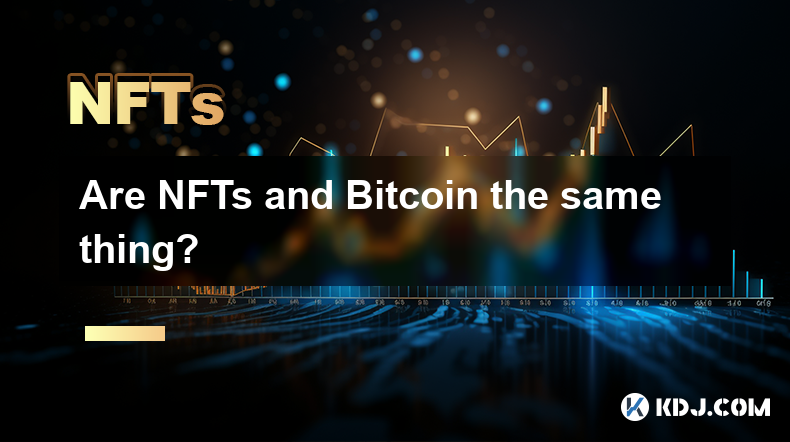
This question often arises among newcomers to the cryptocurrency space. While both NFTs (Non-Fungible Tokens) and Bitcoin operate within the realm of blockchain technology, they are fundamentally different in nature and purpose. Bitcoin is a cryptocurrency designed primarily as a digital currency and store of value, whereas NFTs are unique digital assets that represent ownership or proof of authenticity of a specific item or piece of content. In this article, we will delve into the distinctions between these two, exploring their functionalities, use cases, and how they interact within the broader crypto ecosystem.
What is Bitcoin?
Bitcoin, launched in 2009, is the first and most well-known cryptocurrency. It was created by an anonymous person or group using the pseudonym Satoshi Nakamoto. Bitcoin operates on a decentralized network using blockchain technology, which is a distributed ledger that records all transactions across a network of computers. The primary purpose of Bitcoin is to serve as a digital currency that can be used for peer-to-peer transactions without the need for intermediaries like banks.
Bitcoin's value is derived from its scarcity and the trust in its decentralized system. There will only ever be 21 million Bitcoins in existence, which contributes to its value as a store of value similar to gold. Transactions are secured through cryptographic means, ensuring that once a transaction is recorded on the blockchain, it cannot be altered. Bitcoin's fungibility means that one Bitcoin is equivalent to another, making it suitable for use as a currency.
What are NFTs?
NFTs, or Non-Fungible Tokens, are a type of digital asset that represents ownership or proof of authenticity of a unique item or piece of content. Unlike Bitcoin, NFTs are not interchangeable; each token has distinct information or attributes that make it unique. NFTs are built on blockchain technology, often using the Ethereum blockchain, which allows for the creation and verification of these unique digital assets.
The use cases for NFTs are vast and varied. They can represent digital art, music, videos, virtual real estate, and even tweets. The uniqueness of each NFT is what gives it value, as it can be bought, sold, and traded like any other piece of property. The ownership of an NFT is recorded on the blockchain, providing a transparent and immutable record of who owns what.
Key Differences Between NFTs and Bitcoin
The fundamental difference between NFTs and Bitcoin lies in their nature and purpose. Bitcoin is a fungible token, meaning each unit is interchangeable with another. If you have one Bitcoin, it is equivalent to any other Bitcoin. This fungibility makes Bitcoin suitable for use as a currency. On the other hand, NFTs are non-fungible, meaning each token is unique and cannot be exchanged on a one-to-one basis with another token.
Another key difference is their use cases. Bitcoin is primarily used as a digital currency and a store of value. It can be used to purchase goods and services, or held as an investment. NFTs, however, are used to represent ownership of unique digital assets. They are often used in the art world, gaming, and other digital content industries to prove ownership and authenticity.
The technology behind them also differs slightly. While both use blockchain technology, Bitcoin uses its own blockchain, whereas NFTs are often built on existing blockchains like Ethereum. This allows NFTs to leverage smart contracts, which are self-executing contracts with the terms directly written into code, enabling more complex functionalities.
How NFTs and Bitcoin Interact
Despite their differences, NFTs and Bitcoin can interact within the cryptocurrency ecosystem. For instance, some NFT marketplaces accept Bitcoin as a form of payment, allowing users to purchase NFTs using their Bitcoin holdings. Additionally, some platforms have developed ways to tokenize Bitcoin into NFTs, creating unique digital assets that represent ownership of a specific amount of Bitcoin.
However, the primary interaction between NFTs and Bitcoin occurs through the broader crypto ecosystem. Both assets can be held in digital wallets, traded on exchanges, and used in various decentralized finance (DeFi) applications. The rise of NFTs has also led to increased interest in cryptocurrencies like Bitcoin, as more people enter the space to explore these new digital assets.
The Future of NFTs and Bitcoin
The future of NFTs and Bitcoin is a topic of much speculation and interest within the cryptocurrency community. Bitcoin, being the first cryptocurrency, has a well-established place in the market and is seen as a long-term store of value. Its future is likely to be influenced by regulatory developments, technological advancements, and broader adoption as a currency.
NFTs, on the other hand, are still a relatively new phenomenon, and their future is less certain. However, the potential for NFTs to revolutionize industries like art, gaming, and digital content is significant. As more use cases are developed and the technology matures, NFTs could become an integral part of the digital economy. The interplay between NFTs and Bitcoin will likely continue to evolve, with both assets playing unique roles in the broader cryptocurrency ecosystem.
Common Questions About NFTs and Bitcoin
What is the main difference between NFTs and Bitcoin?
The main difference between NFTs and Bitcoin is their nature and purpose. Bitcoin is a fungible cryptocurrency designed as a digital currency and store of value, while NFTs are non-fungible tokens that represent ownership of unique digital assets.
Can you buy NFTs with Bitcoin?
Yes, some NFT marketplaces accept Bitcoin as a form of payment, allowing users to purchase NFTs using their Bitcoin holdings.
Are NFTs built on the same blockchain as Bitcoin?
No, NFTs are often built on different blockchains, such as Ethereum, which supports smart contracts and more complex functionalities. Bitcoin uses its own blockchain, which is primarily designed for financial transactions.
Can Bitcoin be turned into an NFT?
Yes, some platforms have developed ways to tokenize Bitcoin into NFTs, creating unique digital assets that represent ownership of a specific amount of Bitcoin.
What are the use cases for NFTs?
NFTs can represent digital art, music, videos, virtual real estate, and even tweets. They are used to prove ownership and authenticity of unique digital assets.
How does the value of Bitcoin compare to NFTs?
Bitcoin's value is derived from its scarcity and trust in its decentralized system, making it a store of value similar to gold. The value of NFTs, on the other hand, is based on their uniqueness and the demand for the specific digital asset they represent.
Can NFTs and Bitcoin be held in the same wallet?
Yes, both NFTs and Bitcoin can be held in digital wallets that support multiple cryptocurrencies and digital assets.
How do regulatory developments affect NFTs and Bitcoin?
Regulatory developments can impact both NFTs and Bitcoin. For Bitcoin, regulations can affect its use as a currency and its status as a store of value. For NFTs, regulations can influence the creation, sale, and ownership of digital assets.
What role do smart contracts play in NFTs?
Smart contracts are crucial for NFTs, as they enable the creation and management of these unique digital assets. They allow for the automatic execution of terms and conditions related to the ownership and transfer of NFTs.
How has the rise of NFTs affected the interest in Bitcoin?
The rise of NFTs has led to increased interest in the broader cryptocurrency space, including Bitcoin. As more people enter the market to explore NFTs, they often become interested in other cryptocurrencies like Bitcoin as well.
Disclaimer:info@kdj.com
The information provided is not trading advice. kdj.com does not assume any responsibility for any investments made based on the information provided in this article. Cryptocurrencies are highly volatile and it is highly recommended that you invest with caution after thorough research!
If you believe that the content used on this website infringes your copyright, please contact us immediately (info@kdj.com) and we will delete it promptly.
- Shifting Attention from ADA and XRP to Up-and-Coming Mutuum Finance (MUTM)
- 2025-04-15 15:00:12
- Trump Pauses Tariffs on Imports From China, Boosting Crypto and Stock Markets
- 2025-04-15 15:00:12
- 21Shares AG and the House of Doge Launch the World's First Dogecoin Exchange Traded Product (ETP)
- 2025-04-15 14:55:12
- The governor of the Northern Mariana Islands has killed the legislation that would have allowed one of the territory's local governments to launch a fully backed US dollar-pegged stablecoin.
- 2025-04-15 14:55:12
- Aston Villa vs PSG betting tips
- 2025-04-15 14:50:12
- Bitcoin (BTC) and Altcoins Hold Steady as Hopes of a Fed Intervention Rise
- 2025-04-15 14:45:13
Related knowledge
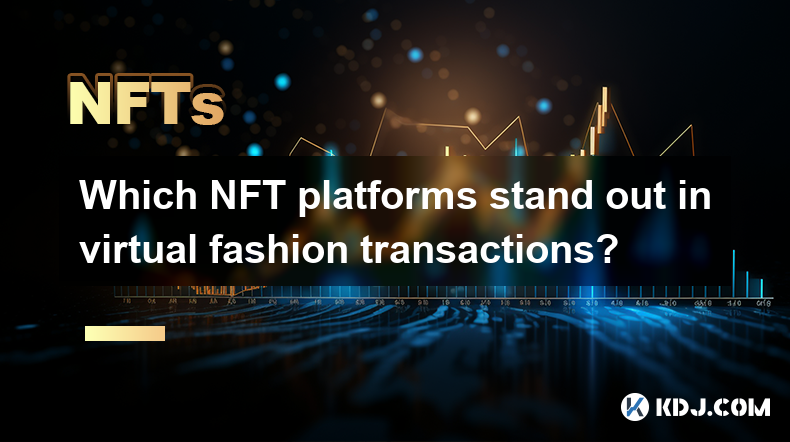
Which NFT platforms stand out in virtual fashion transactions?
Apr 15,2025 at 02:29am
In the dynamic world of cryptocurrency and digital assets, Non-Fungible Tokens (NFTs) have carved out a significant niche, particularly in the realm of virtual fashion. As the demand for unique digital wearables and accessories grows, several NFT platforms have emerged as leaders in facilitating these transactions. This article explores the standout NFT...
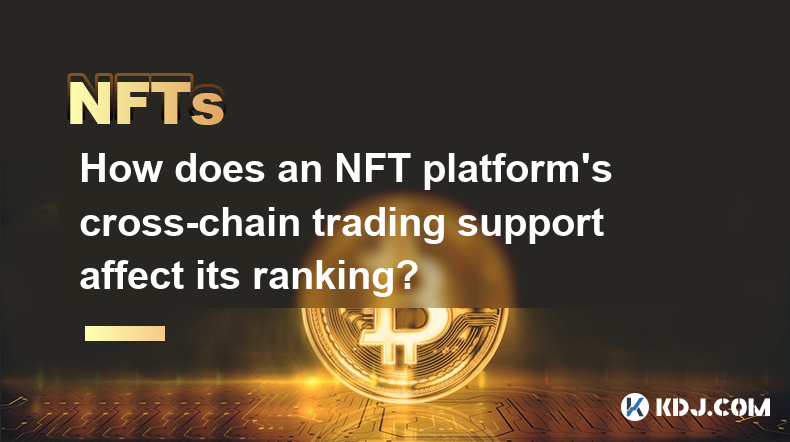
How does an NFT platform’s cross-chain trading support affect its ranking?
Apr 14,2025 at 04:49pm
The impact of an NFT platform's cross-chain trading support on its ranking is a multifaceted topic that delves into the technical capabilities, user experience, and market dynamics of the platform. Cross-chain trading refers to the ability of an NFT platform to facilitate the exchange of non-fungible tokens across different blockchain networks. This fea...
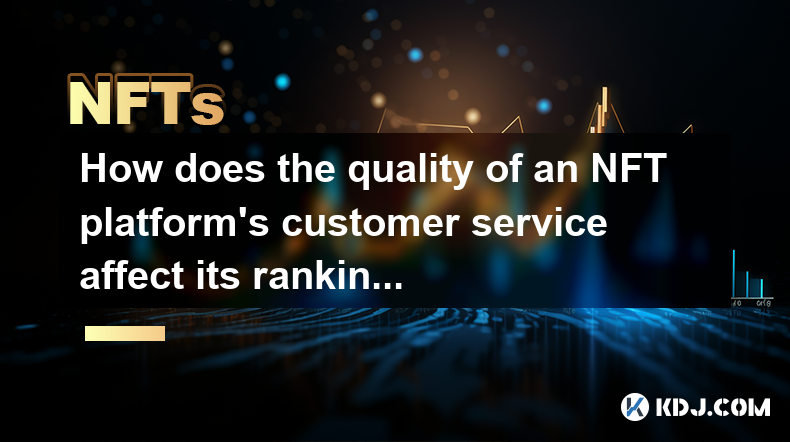
How does the quality of an NFT platform’s customer service affect its ranking?
Apr 15,2025 at 05:49am
The quality of an NFT platform's customer service plays a crucial role in determining its ranking within the competitive landscape of the cryptocurrency and NFT market. Customer service is often the bridge between a platform and its users, directly impacting user satisfaction, trust, and overall experience. This article delves into how different aspects...
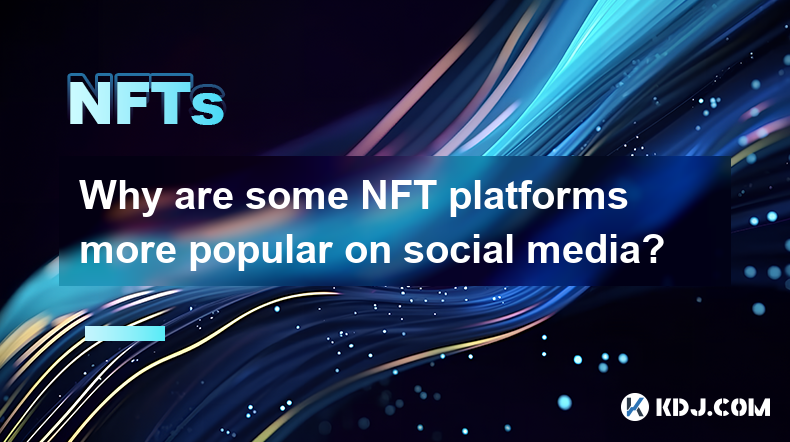
Why are some NFT platforms more popular on social media?
Apr 15,2025 at 01:00am
The popularity of NFT platforms on social media can be attributed to a variety of factors that influence their visibility, engagement, and overall appeal to users. Understanding these factors can provide insights into why certain platforms capture more attention and interaction on social media channels. User Experience and InterfaceUser experience (UX) ...
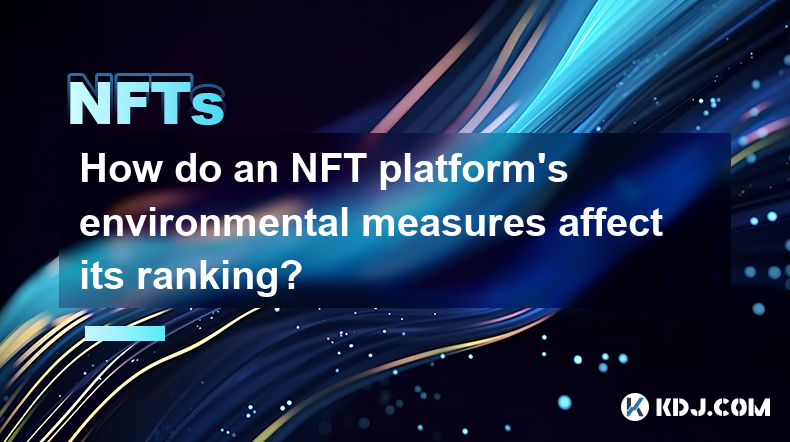
How do an NFT platform’s environmental measures affect its ranking?
Apr 15,2025 at 02:14am
The impact of an NFT platform's environmental measures on its ranking is a topic of growing importance within the cryptocurrency circle. As the digital art and collectibles market grows, so does the scrutiny over the environmental footprint of the blockchain technologies that support these platforms. This article will delve into how these environmental ...

How can brand collaborations with NFT platforms improve their rankings?
Apr 15,2025 at 01:35am
Brand collaborations with NFT platforms have become increasingly popular in the cryptocurrency circle, offering a unique way to enhance visibility and rankings. By leveraging the strengths of both brands and NFT platforms, these collaborations can drive engagement, increase user base, and ultimately improve rankings on various metrics. In this article, ...

Which NFT platforms stand out in virtual fashion transactions?
Apr 15,2025 at 02:29am
In the dynamic world of cryptocurrency and digital assets, Non-Fungible Tokens (NFTs) have carved out a significant niche, particularly in the realm of virtual fashion. As the demand for unique digital wearables and accessories grows, several NFT platforms have emerged as leaders in facilitating these transactions. This article explores the standout NFT...

How does an NFT platform’s cross-chain trading support affect its ranking?
Apr 14,2025 at 04:49pm
The impact of an NFT platform's cross-chain trading support on its ranking is a multifaceted topic that delves into the technical capabilities, user experience, and market dynamics of the platform. Cross-chain trading refers to the ability of an NFT platform to facilitate the exchange of non-fungible tokens across different blockchain networks. This fea...

How does the quality of an NFT platform’s customer service affect its ranking?
Apr 15,2025 at 05:49am
The quality of an NFT platform's customer service plays a crucial role in determining its ranking within the competitive landscape of the cryptocurrency and NFT market. Customer service is often the bridge between a platform and its users, directly impacting user satisfaction, trust, and overall experience. This article delves into how different aspects...

Why are some NFT platforms more popular on social media?
Apr 15,2025 at 01:00am
The popularity of NFT platforms on social media can be attributed to a variety of factors that influence their visibility, engagement, and overall appeal to users. Understanding these factors can provide insights into why certain platforms capture more attention and interaction on social media channels. User Experience and InterfaceUser experience (UX) ...

How do an NFT platform’s environmental measures affect its ranking?
Apr 15,2025 at 02:14am
The impact of an NFT platform's environmental measures on its ranking is a topic of growing importance within the cryptocurrency circle. As the digital art and collectibles market grows, so does the scrutiny over the environmental footprint of the blockchain technologies that support these platforms. This article will delve into how these environmental ...

How can brand collaborations with NFT platforms improve their rankings?
Apr 15,2025 at 01:35am
Brand collaborations with NFT platforms have become increasingly popular in the cryptocurrency circle, offering a unique way to enhance visibility and rankings. By leveraging the strengths of both brands and NFT platforms, these collaborations can drive engagement, increase user base, and ultimately improve rankings on various metrics. In this article, ...
See all articles























































































